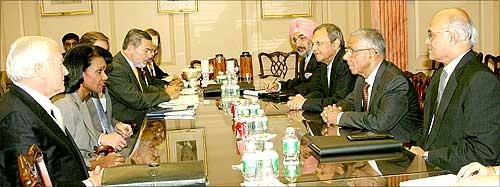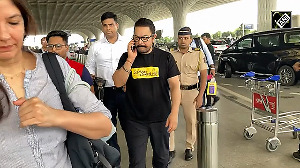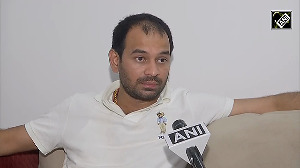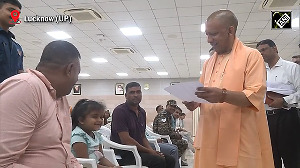 Prime Minister Manmohan Singh said the deal was in its final leg.
Prime Minister Manmohan Singh said the deal was in its final leg.
The man who is dubbed "the 600-pound gorilla in the room", Atomic Energy Commission Chairman Anil Kakodkar, was in the United States to iron out differences.
Even US Secretary of State Condolezza Rice dropped in to assure the Bush Administration's commitment to finalise the deal.
But despite both sides giving it their all, the Indo-US civilian nuclear deal could not be sealed.
Now, they have scheduled another eound of talks for Thursday.
On Wednesday, both sides, led by Under Secretary of State for Political Affairs Nicholas Burns and Indian Foreign Secretary Shiv Shankar Menon, met for several hours.
National Security Adviser M K Narayanan, who is leading the Indian delegation, then went over to the White House to meet with his counterpart Stephen Hadley for one-on-one talks and was then joined for a working luncheon by Menon and Burns. This was even followed by another post-lunch session that went on till late afternoon.
But, at the end of the day, both sides were still stuck on the reprocessing issue with the US, while impressed with India's proposal of a dedicated facility under full-time safeguards to reprocess American nuclear fuel supplies, unwilling to agree to India's insistence that it could not allow for international supervision.
Though the Indian team believed it was addressing Congressional concerns regarding diversion of reprocessed US nuclear fuel to a military facility, the US side, while acknowledging the merits of the proposal, had argued for permission for international supervision.
The Indian side simply couldn't agree to this because Kakodkar will have shot down such a concession in a heartbeat because of the Indian scientific establishment zealous protection of its turf and complete opposition to any international monitoring of India's nuclear facilities.
But administration sources told rediff.com that while the proposal necessarily addresses Congress' concerns, India's insistence that no way would it allow for international supervision wouldn't fly with Congress.
But diplomatic sources reiterated their argument that this would not fly with the likes of Kakodkar and the nuclear establishment in India and would be tantamount to lending credence to those opposed to the nuclear deal who would declare that India had 'surrendered' to the US on the reprocessing issue that was not part of the July 2005 Joint Statement and March 2006 separation plan.
So, as one administration source told rediff.com after both sides had adjourned on Wednesday, "it's a case of so near but yet so far, because no way is Congress going to go for anything short of some kind of international supervision whether by the IAEA or a team of monitors from the NSG (Nuclear Suppliers Group) or something similar."
Text Aziz Haniffa | Photograph: Jay Mandal






